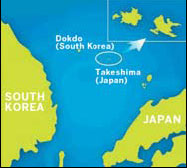
|
An aerial view of the remote islands disputed with Japan, known as Dokdo in South Korea and Takeshima in Japan, in the Sea of Japan (East Sea). South Korean President Lee Myung-bak paid an unprecedented visit on Friday to the islands, prompting Tokyo to recall its ambassador. Since 1954 Seoul has stationed a small coastguard detachment on the islands, which are also inhabited by two civilian residents, an elderly man and his wife. Yonhap News Agency Via Agence France Presse |
South Korean President Lee Myung-bak paid an unprecedented visit on Friday to remote islands disputed with Japan, sparking anger in Tokyo, which recalled its ambassador from Seoul in protest.
It is believed South Korea's culture and environment ministers accompanied Lee on his 90-minute tour of the disputed island known as Dokdo in South Korea and Takeshima in Japan. South Korea's military tightened security around the island.
Japan immediately recalled its ambassador in protest.
"I don't know when he will go back to South Korea," Japanese Foreign Minister Koichiro Gemba told reporters in Tokyo.
Gemba said he would meet the envoy on Saturday for discussions, including what "other measures" Japan could take.
Lee was making the first-ever visit by a South Korean president to the rocky volcanic outcrops in the Sea of Japan (East Sea), whose ownership has been disputed for decades.
Since 1954, Seoul has stationed a small coastguard detachment on the islands.
Gemba also summoned South Korea's ambassador in Tokyo to make a strong protest.
"I told him I have no understanding of why President Lee visited the islands at this time," said the foreign minister, who had warned earlier in the day that a visit "would have a great impact" on relations.
Japanese Chief Cabinet Secretary Osamu Fujimura called the trip "extremely regrettable" at a time when Tokyo was seeking relations with Seoul that looked to the future rather than the past.
US State Department spokesman Patrick Ventrell earlier expressed hope for good relations between the two key US allies after being asked about reports that Lee was planning to visit the disputed islets.
Japan's Asahi Shimbun newspaper said on Friday that Lee's move is likely to "paralyze" South Korea's relations with Japan.
Though Lee's term is scheduled to end in February, his visit could affect the next South Korean president's policy toward Japan. An election will be held at the end of the year, the newspaper said.
It also quoted analysts as saying that Lee is likely to have made the visit to Takeshima due to his increasing distrust of Japan, caused by its inaction on historical issues, including that of the comfort women.
Lee's visit came just days before the August 15 anniversary of Japan's World War II surrender, which ended its 35-year rule over Korea.
South Korea last week summoned a senior Japanese diplomat to protest his country's renewed claim to the islands in its latest defense white paper.
Seoul announced it will stage a regular military exercise near the islands in mid-August.

In addition, money scandals involving Lee's close associates may have played a part in his decision to visit the disputed island, the newspaper said.
Seoul-based Yonhap News Agency also cited analysts as saying that the trip could affect exchange projects with Japan, such as now-stalled efforts to forge what would be their first-ever military pact and negotiations to work out a free trade agreement between two of Asia's largest economies.
The planned signing of the military information-sharing deal was put on hold at the last minute in late June as a result of domestic criticism.
"Relations between South Korea and Japan cannot but be strained," said Chin Chang-soo, a senior analyst on Korea-Japan affairs for the Sejong Institute think tank. "Tensions could last for a long time."
But others said the visit shows Seoul's firm intention to safeguard its sovereignty.
"This could be an opportunity to get Japanese political leaders to awaken to the fact that this is an issue serious enough for South Korea's president to take action," a retired diplomat said on condition of anonymity.
Another analyst said the visit was right but it came too late in his term. "This needs to be more than a mere effort to influence opinion polls," said Lee Jun-han, a professor at Incheon University.
Lee's visit drew mixed reactions from political parties and social groups at home.
The ruling Saenuri Party welcomed the visit, saying it was a "meaningful" move that demonstrated South Korea's will to defend its territory.
The main opposition Democratic United Party, however, warned the government against trying to deflect criticism about its recent failures with what the party characterized as a publicity stunt.
Some members of the public also voiced reservations about Lee's visit.
"The fundamental cause of tensions between South Korea and Japan lies in our politicians using (the two countries') bilateral issues as a political propaganda tool," said Lee Tae-ho, director of People's Solidarity for Participatory Democracy, a left-leaning civic group.
Lee's five-year term is set to end in February, and by law, he cannot seek re-election.
The disputed island covers a total land area of 18.7 hectares.
Apart from the coastguard there are two civilian residents, an elderly man and his wife.
It is sited amid rich fishing grounds. Seoul officials say the seabed contains reserves of gas hydrates, although the amount is still unclear.
AFP-AP-China Daily